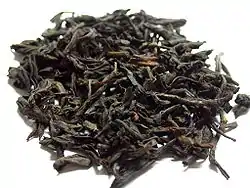正山小種
See also: 正山小种
Chinese
Pronunciation
Japanese

Etymology 1
| Kanji in this term | |||
|---|---|---|---|
| 正 | 山 | 小 | 種 |
| Grade: 1 | Grade: 1 | Grade: 1 | Grade: 4 |
| Irregular | |||
Borrowed from Cantonese 立山小種 (laap6 saan1 siu2 zung2, literally “sub-variety from Lapu Mountain”).
The spelling was apparently changed prior to borrowing into Japanese, replacing the 立 (laap6) character with the 正 (zeng3) character while keeping the pronunciation unchanged.
The reading is an approximation of modern Cantonese, and is thus neither on'yomi nor kun'yomi.
Alternative forms
Usage notes
This reading appears to be the most common.
Etymology 2
| Kanji in this term | |||
|---|---|---|---|
| 正 | 山 | 小 | 種 |
| せい Grade: 1 |
さん Grade: 1 |
しょう Grade: 1 |
しゅ Grade: 4 |
| on’yomi | |||
The spelling is borrowed from Chinese 正山小種. The reading is the expected on'yomi for these characters.
Usage notes
This reading appears to be substantially less common than rapusan sūchon above. However, it is also the most obvious reading from a Japanese perspective, using the standard Japanese pronunciation of the characters.
This article is issued from Wiktionary. The text is licensed under Creative Commons - Attribution - Sharealike. Additional terms may apply for the media files.